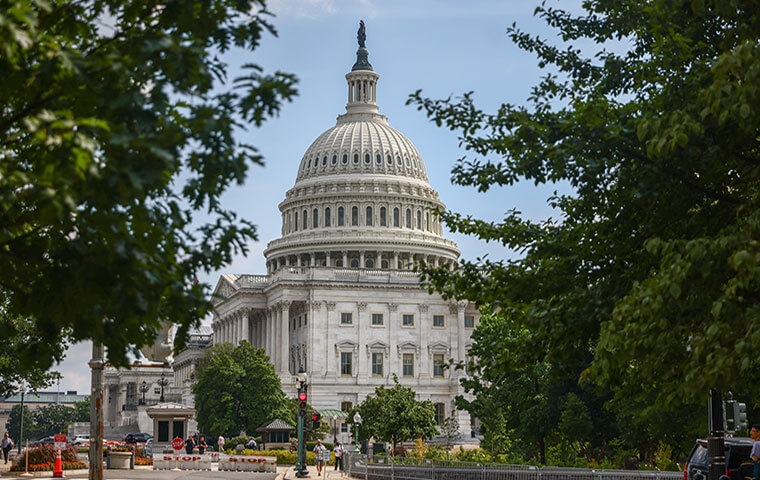 US Capitol building is seen ahead of the NATO Summit that will take place on 9-11 July 2024 and will commemorate the landmark 75th anniversary of NATO, which was founded on 4 April 1949 with the signing of the North Atlantic Treaty. Image: Beata Zawrzel/NurPhoto/Shutterstock
By: FEDweek Staff
US Capitol building is seen ahead of the NATO Summit that will take place on 9-11 July 2024 and will commemorate the landmark 75th anniversary of NATO, which was founded on 4 April 1949 with the signing of the North Atlantic Treaty. Image: Beata Zawrzel/NurPhoto/Shutterstock
By: FEDweek StaffA long list of proposals affecting federal employment policies, including one seeking to put in law a ban against a future Schedule F, has been offered as amendments to the general government spending bill in advance of a House vote.
That appropriations bill, a key annual vehicle for Congress on federal workplace policies, likely will come to a vote on the House floor during the week of July 22. That measure already contains a number of such provisions, many of them reflecting broader priorities of House Republican leaders.
Federal employee organizations have especially been watching for action designed to block the possible return of an excepted service Schedule F. That was a short-lived Trump administration directive that could have stripped many career protections from tens of thousands of competitive service federal employees involved with policy matters. While OPM recently finalized rules to block the return of such a policy by executive order, those rules could be overturned by a second Trump administration; putting a ban in law would erect a higher hurdle of a new change in law.
However, the amendment, offered by Rep. Gerald Connolly, D-Va., first would have to be accepted for consideration by the House Rules Committee, which is dominated by Republicans. In addition, language in an appropriations bill typically can apply only for the budget year it covers, in this case fiscal 2025 starting in September. Another potential route would be as an amendment to the DoD authorization bill pending a vote in the Senate. Language in that bill would change the law with no expiration date.
Democrats also are offering amendments to the general government bill to bar agencies from testing federal employees for marijuana use in states that have legalized it; and to delete language in the bill to bar DEI programs in federal agencies.
Republicans meanwhile are offering amendments including to ban regular telework or remote work at the SBA; restrict funding for OPM to current levels; restrict funding for the IRS to 2019 levels; and bar coverage of gender-affirming surgery in the FEHB program.
Among the few bipartisan amendments is one that would stop the USPS from carrying out mail processing facility reviews under its currently largely suspended Delivering for America Plan.
There have been no amendments offered so far regarding the January 2025 federal employee pay raise. By being silent on that issue, the underlying bill effectively endorses the 2 percent recommended by President Biden to take effect by default.
The underlying bill would ban enforcement of a Biden administration order for agencies to support voting and that also opened the way for expanding paid time off for federal employees to vote or to perform roles such as poll worker; ban reimposition of COVID-19 vaccine or mask mandates in the federal workplace of the sort the administration imposed and later lifted; bar investments through the TSP mutual fund window in funds that use environmental-social-governance criteria in selecting investments; and order a plan within six months for reducing office space where the utilization rate is less than 60 percent, based on 150 usable square feet per person.
Senate Eyes Vote to Pay Federal Employees Working Unpaid
Series of Bills Offered to Address Shutdown’s Impact on Employees
Public Starting to Feel Impact of Shutdown, Survey Shows
OPM Details Coverage Changes, Plan Dropouts for FEHB/PSHB in 2026
Does My FEHB/PSHB Plan Stack Up? Here’s How to Tell
2025 TSP Rollercoaster and the G Fund Merry-go-Round
See also,
TSP Takes Step toward Upcoming In-Plan Roth Conversions
5 Steps to Protect Your Federal Job During the Shutdown
Over 30K TSP Accounts Have Crossed the Million Mark in 2025

